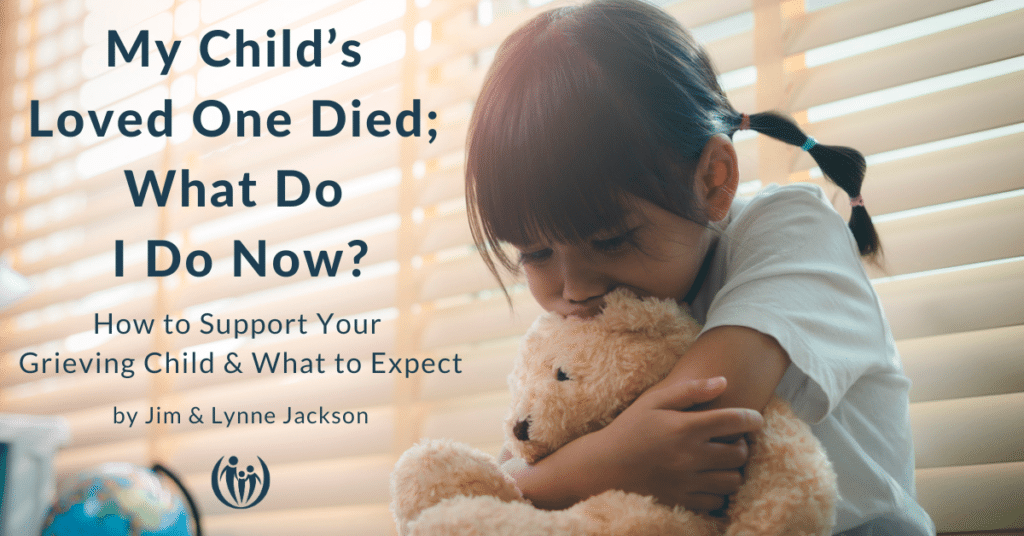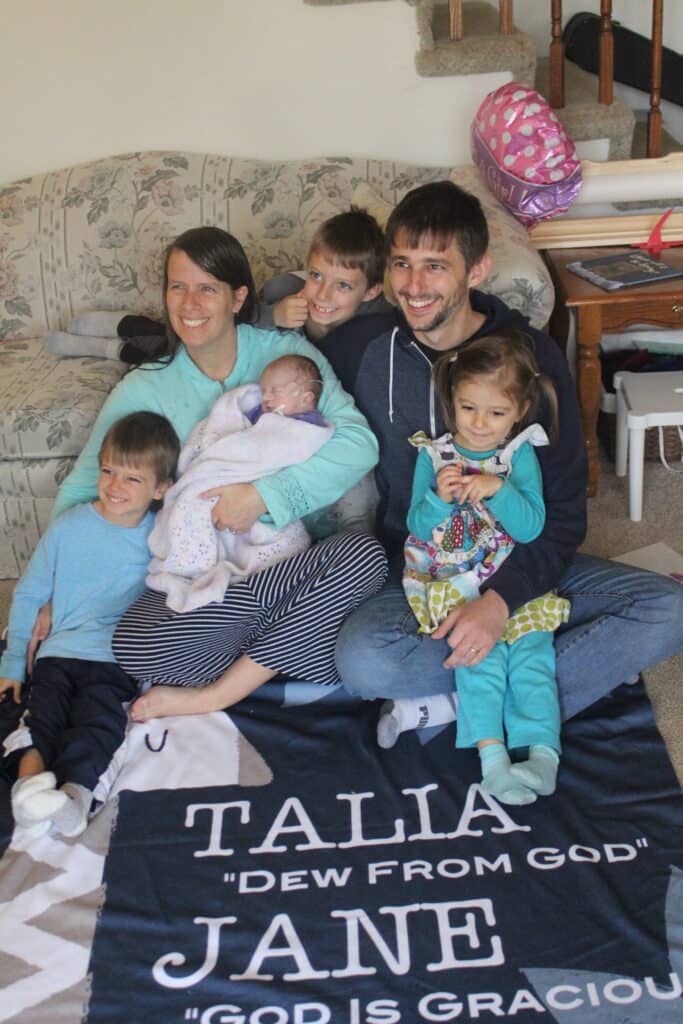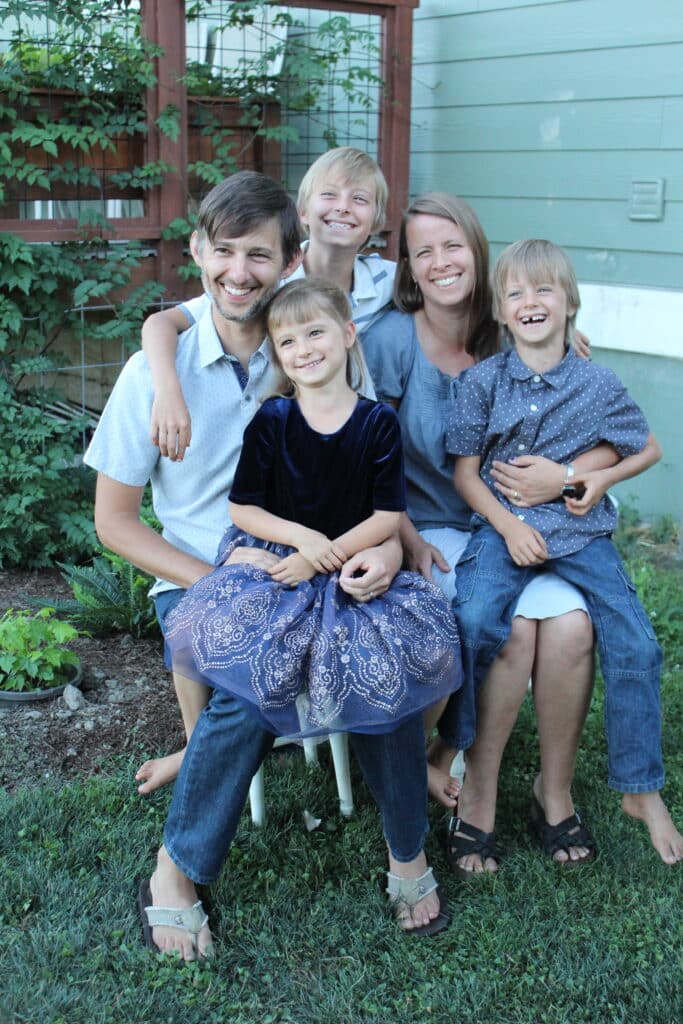
My Child’s Loved One Died; What Do I Do Now? How to Support Your Grieving Child & What to Expect

Navigating the complex and often heart-wrenching journey of grief with your child may feel like an immense parenting challenge, especially if you are also grieving. You want your child to feel safe, loved, and capable of working through difficult emotions. Whether your child is grieving a grandparent, parent, sibling, friend (or even a pet), there is hope as they walk through grief at their developmental level with your loving care.
This article is based on the profound journey of a family in the Connected Families community. A journey marked by loss, grief, and, ultimately, the path toward healing. This vulnerable, authentic story is filled with Holy Spirit insights that aren’t in a typical “self-help for grief” article. Through their story, the Yoder family has given Connected Families a precious gift to share.
Even if the grief you or your child is experiencing is less extreme than the death of a loved one, there are rich insights to gain through this story. Throughout, there will be questions to help guide you in your own process of grief.
Within a relatively short time period, Brendon and Naomi’s family experienced a series of life-altering difficulties. They went through seasons of grief without an opportunity to recover before facing the next loss:
- While serving as Wycliffe Bible translators in Indonesia, the family experienced a flash flood. They had to flee to their rooftop for a few hours before being rescued and then living with other missionaries while fixing their home.
- A week after the flood, Naomi experienced a miscarriage.
- About four months later, the family lost their visa status and were suddenly required to leave the country.
- After returning to the United States, their youngest daughter, Talia, was born and diagnosed with Trisomy 13. She died just 46 days after birth.
The whole Yoder family had envisioned returning to Indonesia with all four kids (Luke, Silas, Analeigh, and Talia) playing together in the jungle. Talia’s death sent them reeling. And because they were not in their familiar home and culture, the lack of stability made the grief process even more complicated for their young kids.
But nothing, even their tumultuous and unpredictable circumstances and emotions, could separate them from God’s love. (Romans 8:38-39) The following story describes the Yoder family’s journey to embrace this transformational truth.
In the face of these layered, compound losses, Naomi and Brendon clung to this thought: that in suffering, we get to experience a closeness with Jesus that is rarely experienced outside of suffering.
This notion gave them permission to consider and live by a new idea: Their own authentic, Spirit-led grieving was the foundation for helping their kids navigate grief and loss.
This idea became the starting point.
Your own authentic, Spirit-led grieving is the foundation for helping your kids navigate grief and loss.
Face grief with openness and honesty
We each grieve in our own way
The Yoder’s story highlights the complexities of grieving within a marriage. “We felt the constant pressure trying to pull us apart.” They experienced a variety of phases and big emotions, but not in a predictable order, and the two of them were rarely in the same grief phase at the same time.
Naomi is generally more emotionally expressive, and she sometimes grappled with intense anger. She stated, “I remember being so mad when we saw others with babies. It was so difficult!”
Depression and loneliness would also set in. “It was really lonely because it didn’t feel like anyone could understand just how deep the pain was.” Naomi wrote psalms of lament to pour out her dark emotions to the Lord, and she had a strong image of Jesus being with her at the cross.
Early in the process, biblical teaching often seemed empty. By faith, Naomi kept digging. She shared that when a verse stood out to her or somehow helped her, “In big font, I typed it out, and I stuck them all over the walls of our house. I needed constant simple reminders of truth to keep me afloat for my kids.”
She also learned to notice and embrace the occasional moments of joy. “It was good for me to know that I can actually carry immense joy and immense sorrow at the same moment. They are not always opposed to each other.”
Brendon wrestled a lot with anxiety and fear. “It seemed like we were in a downward spiral, and bad things were going to keep happening. I felt like I should have been able to protect my family, and I just wanted to ‘fix’ it. To make the craziness stop and make everyone feel better.” For him, grieving often looked like logistical and practical actions to support his family.
He stated, “The regular here-and-now routine of the kids helped bring us out of our own heads and our own grief and realize that things are still going on. The kids helped ground us.”
Healing for Brendon was a slow process of anchoring in God’s truth. “I gradually became more aware that I could release the feeling of hopelessness and remember the Lord is with us. It’s His family, not mine. He’s the Father over all of us. Recognizing His sovereignty was key for beginning to heal.”
Practical grace and support in marriage
Naomi stated, “We all grieve so differently. That can really affect a marriage. We may think the other spouse doesn’t care as much because it looks so different from our own process. We didn’t always recognize when the other was grieving. Remembering that we grieve VERY differently saved our closeness. We made a commitment early into this to give each other tons of grace.”
That was vital because it would have been easy to judge and disconnect from each other, compounding the isolation and pain. Instead, Naomi and Brendon intentionally figured out what each other needed and then made a plan.
Naomi: “Initially, we took shifts with the kids so we could give each other an hour a day to grieve by ourselves. This was essential at first, but over time, the need for that planned solitary time became less frequent.”
- What is a practical way you could pour out the depths of your dark emotions to the Lord to receive His comfort?
- What are the unique ways in which you grieve compared to other significant adults who are grieving with you?
- How might you recognize and bless those unique expressions?
- What is your need for alone time, and how can you do that for each other? Or, if you are single parenting, how can you get support to have the alone time you need?
Boundaries when emotions are raw
The people who love us most are the ones who most want to be there for us. (Even though they are grieving, too!) But they don’t always know what we really need (which is easy to understand when we may not know either). So they may do and say things that don’t feel helpful. It can be easy at such times to either accommodate their efforts at the expense of our own grieving process or become resentful about their efforts.
It’s important to remember that it’s okay to set boundaries. Embracing the reality that well-intentioned people will do and say unhelpful things equips you to advocate for yourself while staying grateful for their kind intentions.
Brendon shared, “For a while after our daughter passed away, we avoided socializing. Because our emotions were so raw, we arrived at her memorial service after it started and left before it ended. Instead of accepting in-person words of comfort, we provided a means for people to write notes.”
Both Naomi and Brendon felt this was extremely helpful because the notes were something they could pull out when they were in an emotional place to process what they were going through. At those times, the notes were often a precious source of the Holy Spirit’s voice of comfort and healing.
Brendon stated, “Initially, we only wanted to talk to people we knew well who had gone through something similar and were going to understand. These people became lifelines. They were so gentle, present, and did a lot of gracious listening. That remained pretty consistent throughout our most intense grief.”
This aligns with the scriptural command to pass on God’s comfort. “He comforts us in all our troubles so that we can comfort others. When they are troubled, we will be able to give them the same comfort God has given us.” 2 Corinthians 1:4 NLT
When Brendon and Naomi were ready, they gradually opened up to connecting again with others who genuinely cared, including those in their online community.
Setting boundaries this way was an example of self-compassion, which has been shown to improve outcomes for children in bereaved families. “Self-compassion involves nonjudgmental awareness of negative thoughts and emotions and a sense of empathy, which can enable the caregiver to pay attention and respond to their own and their child’s stress or distress.”
- How might you advocate for your needs even if it feels awkward?
- Who might be someone in your community who has gone through something similar and can support you in your grief?

Healing for the brain and body impacts of grief
In grief, it’s not just your soul but your brain that has suffered trauma. Neurologist Lisa Shulman, MD, is quoted as saying, “Traumatic loss is perceived as a threat to survival… This response engages the fight or flight mechanism, which increases blood pressure and heart rate and releases specific hormones. Grief and loss affect the brain and body in many different ways. They can cause changes in memory, behavior, sleep, and body function, affecting the immune system as well as the heart. It can also lead to cognitive effects, such as brain fog.”
Our nervous systems are largely formed around our attachments to the people we love. It can be “shocking” and disorienting to suddenly lose a person our brain is wired around. Our brain pathways are slow to adjust. I (Jim) have worked through the emotional pain of losing my mom, but I still have daily impulses to call her. My brain pathways are still in denial. Cognitively, we may know the person is gone, but our physiology is slow to catch up, making denial a classic phase of grief.
Sleep
Sleep is vital for healing brain trauma, but stress can make sleep elusive. When Brendon and Naomi were very raw, they struggled to sleep. “I had Psalm 116:7 by my bed, ‘Let my soul be at rest again, for the LORD has been good to me.’ I sometimes would fall asleep repeating that verse.“
A friend gave them Christy Nockels’ album Be Held: Lullabies for the Beloved, filled with beautiful, truth-filled, soothing music. Listening to this on repeat could soothe Naomi to sleep when nothing else helped.
(See the end of the article for a resource list of key scripture, music, and books that were helpful for the Yoder’s process.)
Gratitude
“Research is beginning to point to a relationship between resilience in coping with
grief and the cultivation of gratitude… the well-being fostered by gratitude helped to mediate
prolonged grief when coping with the loss of a loved one.”
Naomi felt like the Holy Spirit gave her the gift of gratefulness when they found out about Talia’s diagnosis. “It wasn’t because I mustered up gratefulness. He gave me a crazy desire to write down every good thing I could think of, whether big or small. I think practicing gratitude was a gift to keep me from going into despair, and it was good for our kids also!”
Outside Help
If, despite these helpful strategies, you are feeling stuck or overwhelmed by your grief process, seeking professional help during this time models thoughtful resilience. Naomi struggled with brain fog and shared that a couple of sessions of EMDR therapy were extremely helpful.
Music
The role of music in grief can be profound because it stimulates the emotional part of our brains. “Listening to (or making) music increases blood flow to brain regions that generate and control emotions. The limbic system, which is involved in processing emotions and controlling memory, ‘lights’ up when our ears perceive music.” Even just hearing the first few notes of a song can release the neurotransmitter dopamine, which facilitates sensations of well-being.
Sometimes, when scripture did not resonate as much, the Yoders asked people to share meaningful, comforting worship songs. These were a primary source of comfort and healing they could access when their hearts were ready.
Physical activity
Research shows that physical activity can also play a role in healing: “There is some evidence that physical activity may provide benefit for the physical health and psychological wellbeing of those who have been bereaved, including when the loss has happened at a young age.”
Naomi shared, “Right after Talia died, we would walk for hours every day. It was really good for us to be outside in nature with the kids, exploring and walking. When Brendon and I had our hours alone, we both usually walked that whole hour (or went for a run).
Later on, when I was feeling really depressed, God made it clear to me that I should try to start my day with exercise even when I didn’t feel like it. With my difficulty with sleep, that felt extra hard! Lively worship music was essential for motivation. God knew best and those morning exercises helped me stay much more sane. I was a much more present and peaceful mom when I exercised.”
- To what degree do you feel like your brain is not working as it has in the past?
- What steps would be helpful to support your physical, emotional, and spiritual needs?
God will intimately walk each of you through the grieving process in your own unique way and timetable. For each family member, there is tremendous intimacy with God to be learned in this difficult journey. But you don’t have to guide your kids’ process perfectly, and you don’t have to have all the answers. The Holy Spirit is invested in bringing this work to completion.
“…being confident of this, that he who began a good work in you will carry it on to completion until the day of Christ Jesus.” Philippians 1:6
God will intimately walk each of you through the grieving process in your own unique way and timetable.
Related Posts
The Connected Families Framework guides support for your grieving child
While Brendon and Naomi were reeling from their own grief, their kids’ process of grieving added so much more complexity. “Watching our kids grieve was really hard. How can you figure out what to say to your grieving child when you are struggling with grief yourself?” They found the Connected Families Framework hugely informative for their journey.
Here are practical insights about how to help your child through their grief, interwoven with the principles of the Connected Families Framework.
You are SAFE with me
The gift of presence and listening
Sometimes, the best comfort comes not from the words we say but from our unspoken presence – simply being there. Being peacefully present creates an environment for expressing emotions freely without judgment. Grieving individuals (including children!) often need to share their stories. Be there to listen, truly listen. The Yoders learned to listen deeply.
“…throughout all time, we have healed by the telling of our stories.” Dr. Karyn Purvis
Enter into kids’ emotions
Yoder’s daughter Analeigh was only three years old when her baby sister died. She didn’t know any “shoulds” about grieving. She grieved in spontaneous, passionate ways without pretense. Rather than dismiss or diminish her expressions, Naomi and Brendan empathized and even entered into those emotions. “Analeigh led our family in expressing grief sometimes.” God used those times to help them all embrace authenticity in their emotions, no matter how intense or difficult.
Analiegh is now seven and is grieving differently now that she is developmentally able to understand that death is permanent. (See this link for information about kids’ developmental stages of grief.) Leading her through a difficult time and communicating, “I love you, and I’m right here. Whenever you are ready, I’m here to talk about it,” reminds her parents of how Jesus communicates that to us in our dark moments.
Grief is a journey with no map and no estimated time of arrival. Honor your kids’ process, no matter how long it takes. Regularly check in with your child and be there even after the initial period of loss when others may have moved on.
- How might you create a safe environment for your kids to express complicated feelings?
You are LOVED no matter what
We visited the Yoders last year, and their home is brimming with joy. This is not to say their grief has passed, but it’s clear they have been highly intentional in keeping a loving connection firmly in place through the ups and downs of their ongoing seasons of grief.
Individual connection
When adults are struggling with dark emotions, kids may feel their parents’ angst and think it is their fault. Extra focused reassurance is vital. Brendon and Naomi recognized their children’s need for individual support. They created a flexible plan for each parent to have unstructured time alone with each child every three days.
“Our only agenda was connection. We wanted our kids to know that our relationship with them was still intact, that they were still very special and seen. They usually didn’t choose to talk about grief during those times, but they would always come back feeling more connected to us.”
Active compassion
It can be comforting to kids when you come alongside and offer practical help. Can you offer to help your child with their chores? Create special experiences or treats? When I asked what their parents did that was helpful, their oldest son, Luke, said, “On days it was extra hard, Dad made extra yummy breakfasts.”
- In what ways does your love land on your child most effectively?
- What would it take to carve out some individual time for your child?
You are CALLED and CAPABLE
Pray for your kids’ process
Empower your kids to take ownership of their healing journey. They are called to and capable of listening to God’s Spirit as He guides them through their grieving process. Remembering this can help you to pray peacefully and trust with confidence. During this time, Naomi prayed that the Holy Spirit would speak to their kids. And He clearly did…
Silas had a dream when Talia was still with them in which he saw rainbow dust falling down. “I saw Jesus’ love!” When he touched the colors, he felt the love of Jesus. He saw all the beautiful colors (some he did not know at the time) and a venomous snake that exploded as the rainbow dust fell on it. His parents discussed that dream with the kids as something the Lord gave them for comfort during this difficult time.
In our interview, Luke paraphrased a very meaningful verse to him, “Heaven is so amazing no one can even remember staying here on earth. It was comforting to think of my Talia being in such a wonderful place!”
He also recalled a song lyric, “When God made the earth… He wrote his song into everything.” “Even when Talia was so sick, I could still just see her singing,” Luke said. He saw her with spiritual eyes in the Kingdom of God!
Kids are called to and capable of listening to God’s Spirit as He guides them through their grieving process.
Document and affirm your kids’ love for the person who died
Acts of remembrance can be a step toward healing, as seen in Joshua 4:7, where stones of remembrance were set as a sign among the Israelites after a long season of trauma. You can help kids create a memory book with photos, stories, and memories that celebrate the life of their loved one.
The Yoders made a book for each of the kids with pictures and descriptions of what that child did with their sister while she was alive. Luke said this was so valuable because it was “firm proof that we were really loving on her!” (This would be especially valuable if a child who died had been old enough to have conflict with their siblings. Those siblings may now feel somehow responsible for the death.)
Naomi shared, “We found comfort in something the hospice nurse said, ‘If love could heal people, then this little girl would not die!’ We loved our daughter the best we could.” Their kids were comforted by knowing they had been good big brothers and a good sister to her.
Read helpful books
One book with two polar bear characters, Ida, Always discusses ways to express grief: stomping and growling times, quiet together times, laughing times, remembering times, and quiet alone times. The bears grieve together, anticipating the death of Ida. Luke shared that this book “really helped me and still helps me now.” (See the resources at the end of the article for other helpful children’s books.)
Encourage Expression
There is no right or wrong way to release grief, and there are many different ways to express it. Whether through art, music, or writing, creative expression can be a therapeutic outlet for those in grief because those activities connect well with the emotional centers of your brain.
The kids benefited greatly from using art to process the big flood in Indonesia. Now, Analeigh often wants to make things for Talia to put in the stocking they have for her.
Since play is the language of children, it can also be a vehicle for expressing grief. “PTSD symptoms in children with traumatic grief can include… imagining rescuing the person and reversing the outcome.” It’s helpful for parents to realize that this can be part of the healing process. The Yoder children often played a game called “sick baby,” where they could help heal Talia.
Embrace Individuality in Grief
Support each child’s personal healing, whether it’s subtle or intense, alike or different from yours. Naomi’s grieving style was a lot like Luke’s big emotions. Luke shared, “When I was really angry, I felt I was big enough to defeat whatever it was.” He and Naomi went to the attic and repeatedly yelled loudly, “IT ISN’T FAIR!!!” towards God. Luke said, “That was really helpful, like God understood me.” Following the example of the psalmists, this was a practical way to mentor a child in expressing faith-filled anger toward God.
- What bible verses/prayers might you share with your child to encourage them to listen to God’s Spirit as they grieve?
- Given your child’s unique personality and needs, how might you come alongside their grief process? (supporting art, music, play; reading books; making a memory book…
You are RESPONSIBLE for your actions
Relax expectations for responsibility
Expect grieving children to be more irritable and possibly less compliant than usual. (Maybe you even do their chore for them on a rough day.)
In a wonderful, corresponding podcast on this topic of helping kids with grief, Stacey Rodenbeck, whose husband died unexpectedly, shares about discerning whether her daughter’s bedtime stalling and demands were behavioral choices or if she was anxiously grieving and fearing death.
In any case, loving connection is the start of any correction or boundary setting.
Like Stacey, Naomi and Brendon also learned to recognize grief manifesting like misbehavior, especially during their season of intense grief. They adjusted their homeschooling expectations because learning was much more challenging for their kids. “We were pretty relaxed about school during that season. We kept the comfortable rhythms of school but kept it light with very little pressure, and our kids caught up later on.”
Connected Families Parent Coach Lydia Rex talks about how to provide extra support (“scaffolding”) when your child is struggling: “Scaffolding means you stop to think: ‘How could I make this a ‘just-right-challenge’ [given my child’s current emotional state] so we can take a step of growth and have something to build on and celebrate?’ You might reduce the expectation, break it into steps, provide presence and encouragement, turn up the fun with playfulness, and/or do a regulating sensory activity.”
- What responsibilities are your kids struggling with? How might you relax expectations and provide extra support?
The Bottom Line: God’s Presence and Purposes in Our Pain
So where are the Yoders now?
An intensely challenging experience like grieving the loss of a family member reshapes a family. Healing continues for the Yoders but will not be complete this side of Heaven. Every year during the time period that Talia struggled for life and then passed to eternal life, the pain resurfaces in a more acute way than it does during the rest of the year.
Naomi stated, “We have noticed that our bodies truly somehow do ‘keep the score.’ From January 15 to March 1, Brendon and I both struggle with sleep, and we often feel more on edge than is normal for the rest of the year. I don’t know how long this will last for us. It’s been four years now. But it has been helpful for us to notice it and give ourselves and each other more grace during that season.”
But grief has also brought rich insight and depth to their family. Brendon shared, “It radically changed what I understand it means for God to be good and to live in His blessing. I thought it was somehow connected to how happy I am on the earth. But if the Lord is with me in my deepest grief and when everything is falling apart, then that must be the most important part… His presence. It’s not really about anything else. It’s the fact that He came to be with us. I don’t think I really understood what it meant, that everything could go wrong, and yet God was still with me.”
Their family has had unique opportunities to “comfort others with the comfort they have received from God,” as scripture says. Naomi shared a tender example:
“Luke showed amazing understanding and compassion when his good friend got leukemia. He wrote him a note with verses about how Jesus will never leave him or forsake him no matter what happens. Since he was diagnosed almost a year ago, all three kids continue to faithfully pray for this friend every meal and bedtime.
All three of our children love to talk about Heaven and what it might be like. For kids, they have an unusually deep connection with Heaven. It’s so beautiful that they can already see this world with a Heaven-conscious, eternal perspective.”

“Since, then, you have been raised with Christ, set your hearts on things above, where Christ is, seated at the right hand of God. Set your minds on things above, not on earthly things. For you died, and your life is now hidden with Christ in God. When Christ, who is your life, appears, then you also will appear with him in glory.” Colossians 3: 1-4
Resources
Music:
- JJ Heller and Ellie Holcomb sing many simple, truth-filled songs about grief and who God is.
- Toby Mac’s son died, and he wrote an album called Life After Death. The three best songs are “Rest“, “Faithfully“, and “Everything About You“.
- Toby Mac’s song “Move(Keep Walkin’)” from his This is Not a Test album was Naomi’s exercise playlist favorite when she was at a low point. (Sometimes you just have to “keep walkin'”.)
- “In the End” by Natalie Grant “is amazing.”
- Christy Nockels’ album Be Held: Lullabies for the Beloved, especially for sleep.
Books/Video
Kids:
- Ida, Always by Caron Levis and Charles Santoso
- The Invisible String by Patrice Karst
- Tear Soup by Pat Schwiebert
- When I’m with Jesus by Kimberly Rae
Naomi:
- Holding Onto Hope: A Pathway Through Suffering to the Heart of God by Nancy Guthrie
- Life Can Be Good Again by Lisa Appelo
- Jesus Wept: God’s Tears are For You by Bruce Marchiano
Brendon:
- A Grief Observed by CS Lewis
- A Grace Disguised: How the Soul Grows Through Loss by Jerry L. Sittser
The book Every Moment Holy: Death, Grief, and Hope is filled with beautiful liturgies about different sources of grief and was a rich source of comfort and help for both Naomi and Brendon.
Favorite Bible verses
- Isaiah 42:16
- Philippians 4:6
- Romans 5:3-5
- Hebrews 11:1
- Matthew 11:28
- Psalm 30:5
- Psalm 43:1-2
- Ephesians 3:14-19
Learn more about the Framework
Want to dig deeper into Connected Families’ Parenting Framework?
Get our FREE ebook, What Kids Need: 4 Messages That Build Identity.



